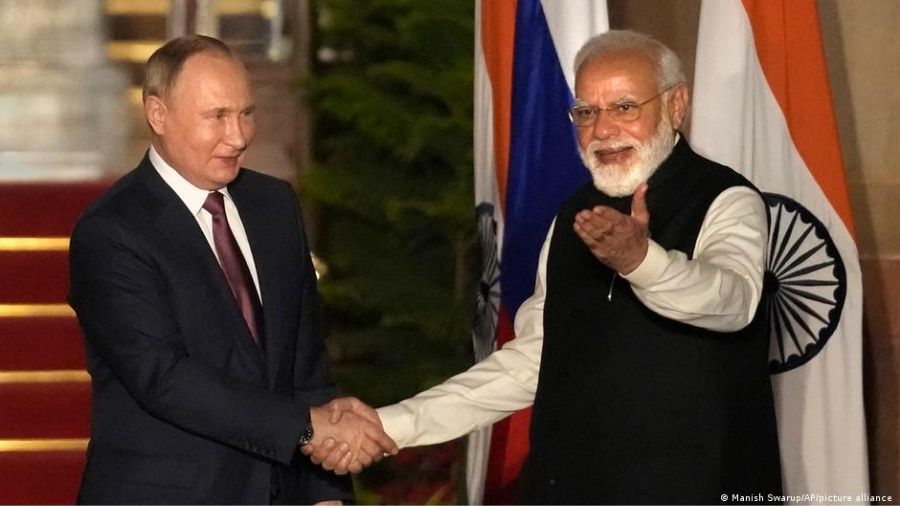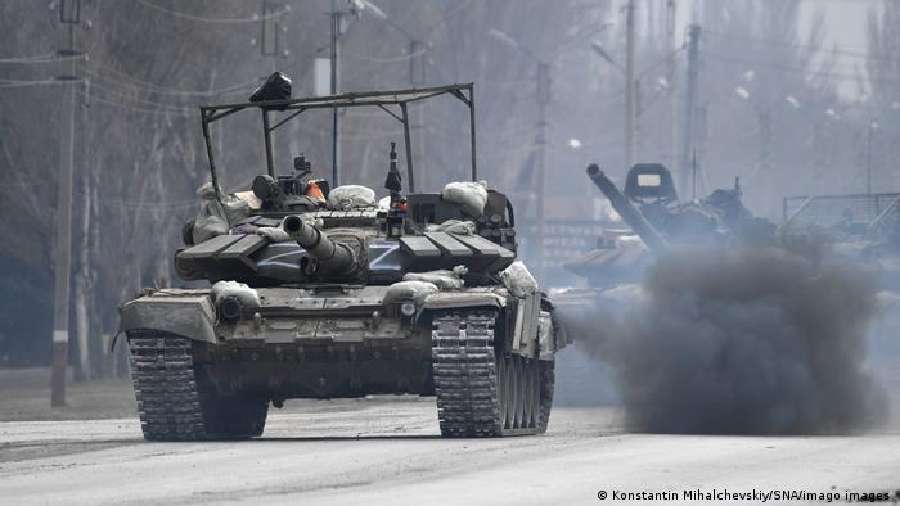India has been walking a diplomatic tightrope since the start of Russia's war on Ukraine, with New Delhi trying to avoid taking sides.
As fighting intensifies on the ground following Russia's invasion of Ukraine, India has been left in a tough spot, with New Delhi struggling to maintain its traditional balancing act between Moscow and the West.
India has attempted to avoid taking sides even as Russia finds itself increasingly isolated from the rest of the world for its war on the former Soviet republic. New Delhi has so far avoided criticizing Moscow for its actions in Ukraine.
Last week, India abstained on a UN Security Council resolution slamming Russia's "aggression" against Ukraine, winning praise from Moscow. New Delhi also abstained from a procedural vote taken in the UNSC to call for a rare special emergency session of the UN General Assembly to meet on the crisis.
Addressing a special briefing on the crisis over the weekend, Indian Foreign Secretary Harsh Vardhan Shringla pointed out that dialogue between the warring sides was the only way ahead.
"We have been engaged with all parties. Our prime minister has spoken with the presidents of Russia and Ukraine. We are essentially a country that has direct interest in the region," said Shringla.
"We have friends and equities in the area," he added.
India's decision to abstain at the Friday Security Council vote left it alongside only Beijing and the United Arab Emirates, while Russia vetoed the resolution.
Strategic ambivalence
It's likely that New Delhi will for now stick to a path of strategic ambivalence on the Ukraine crisis.
"I think India's position has been spelt out clearly in our explanation of vote after the first UNSC resolution where we abstained," former diplomat Deepa Wadhwa told DW.
New Delhi's position is shaped by its concerns over territorial integrity and sovereignty, its unresolved borders and the difficult relationship with its two northern neighbors.
"There are understandable reasons for India's subtle pro-Russia position. An aggressive Russia is a problem for the US and the West, not for India. NATO's expansion is Russia's problem, not India's. India's problem is China," foreign policy and international relations expert Happymon Jacob told DW.
Jacob maintained that the weakening of the US-led global order and the rise of China as a counter-pole throws up a unique and unprecedent challenge for India. Against this backdrop, having Russia on New Delhi's side is crucial, the expert said.
Close defense and energy ties
India and Russia have deep historical ties that go back to the early decades of the Cold War, when New Delhi leant towards the Soviet Union while Pakistan was in the Western camp.
Russia is still by far India's largest supplier of military gear, parts and technology. According to the Business Standard, between 2016 and 2020, almost 50% of its defense purchases were from Russia.
For instance, Russian T-90 tanks form the mainstay of the Indian army, and Russian MiG and Sukhoi fighter jets play a vital role in its air force arsenal.
India recently began taking delivery from Russia of the S-400 missile defense system that it agreed to buy for over $5 billion (€4.5 billion) in 2018, despite the threat of US sanctions.
"India has diversified its sources of defense equipment in recent years, with the USA, Israel and France emerging as major new partners. However, 60% of our defense equipment is still of Russian origin and Russia is a strategic partner mainly in the defense and energy sectors," Meera Shankar, a former Indian envoy to the US, told DW.
"We are also aware of the historical context under which Russia's legitimate concerns about NATO expansion to its doorstep were ignored and opportunities to avert a conflict were lost," added Shankar.
India is also a major consumer of Russian oil. Total annual bilateral trade runs at around $9 billion, with much smaller quantities of pharmaceuticals, tea and coffee going the other way.
Both Modi and Putin met last year to discuss defense and trade relations. They signed an agreement to extend their cooperation in the fields of military technology and energy for the next decade.
In the past, Russia has also repeatedly vetoed UN resolutions condemning New Delhi over its behavior in India-administered Kashmir where a violent insurgency has raged for decades.
Priority is to evacuate Indian nationals
In addition to the impact on India's economy and trade, the ongoing conflict has a direct impact on thousands of Indian citizens. Over 20,000 students from the South Asian country are in Ukraine studying medicine or engineering, accounting for roughly 24% of total international students there.
While New Delhi has evacuated around 4,000 Indians in the last month, about 16,000 still remain trapped in the former Soviet republic, according to the latest data from India's Foreign Ministry.
Despite growing pressure from the West, Indian officials and foreign policy experts believe New Delhi should pursue a pragmatic path and avoid making hasty decisions.
For now, India's priorities are immediate evacuation of its nationals from the war zone, cessation of hostilities and restoration of dialogue between the two sides.
D B Venkatesh Varma, a former diplomat who served as India's ambassador to Russia until last year, believes that India has taken a well-considered and balanced position on the evolving crisis.
"European security is at stake. The diplomatic tight rope is there, not here," said Varma.
From Deutsche Welle Newsfeed












